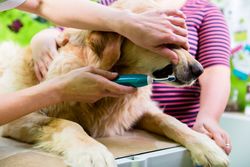What Dog Owners Should Know About Canine Oral Health

Just like people, canines need strong teeth and gums to bite, chew, and eat their food. They can also succumb to a variety of oral health issues, including cavities, gum disease, and tooth loss. Since these problems can impair eating abilities and cause pain and infection, it’s critical for all dog owners to adopt proper pet dental care practices. To help you avoid these complications, here are a few important details you should know about your four-legged friend’s oral health.
How Do I Know if My Dog Has Good Oral Health?
The most accurate way to assess your dog’s oral health is to visit a veterinarian for regular pet dental care checkups at least once a year. However, you can gain a rough idea simply by performing a visual inspection at home.
Once your pup is an adult, they should have 42 teeth. If any are missing, they may be experiencing gum disease or dental infection. These teeth should also be white. Any yellow or brown discoloration suggests a buildup of plaque—a bacterial film that can contribute to gum disease and tooth decay.
Depending on the breed of dog you have, your pet’s gums may be pink, black, or spotted. If they are bleeding, swollen, or red, gum disease is likely present.
Your companion’s dental health may also be in jeopardy if you notice persistent bad breath, a pale tongue, cysts, or oral lesions. These symptoms can indicate the presence of an infection, circulatory health issue, or other complication that requires care from a veterinarian.
How Can I Improve My Dog’s Oral Health?
 Apart from visiting your veterinarian for annual wellness exams, there are several ways you can enhance pet dental care. For starters, it’s important to brush your dog’s teeth and gums at least once a day using oral hygiene products that are approved for animals. This routine care helps remove plaque, minimizing the risk of cavities or gum disease.
Apart from visiting your veterinarian for annual wellness exams, there are several ways you can enhance pet dental care. For starters, it’s important to brush your dog’s teeth and gums at least once a day using oral hygiene products that are approved for animals. This routine care helps remove plaque, minimizing the risk of cavities or gum disease.
You can also help keep your dog’s mouth clean by always providing fresh water to keep them hydrated. With enough fluids in the body, canines are less likely to experience dry mouth—a condition that contributes to tooth decay and gum disease.
Avoiding high-carbohydrate dog treats is also recommended, as these snacks can increase sugar in the mouth and the risk of cavities. Instead, opt for treats that promote chewing and teeth cleaning, such as bones.
If you’re concerned about your dog’s oral health, Animal Care Center of Fairfield can help protect your pet’s smile. In addition to providing standard and emergency animal health services, this Fairfield County, OH, veterinarian offers comprehensive pet dental care, including routine cleanings, exams, and restorative treatments. Understanding that problems can arise unexpectedly, this animal hospital also offers extended weekday hours. To learn more about their services, visit this practice online, or call (513) 829-6621 to schedule an appointment.
About the Business
(22 reviews)
Have a question? Ask the experts!
Send your question

